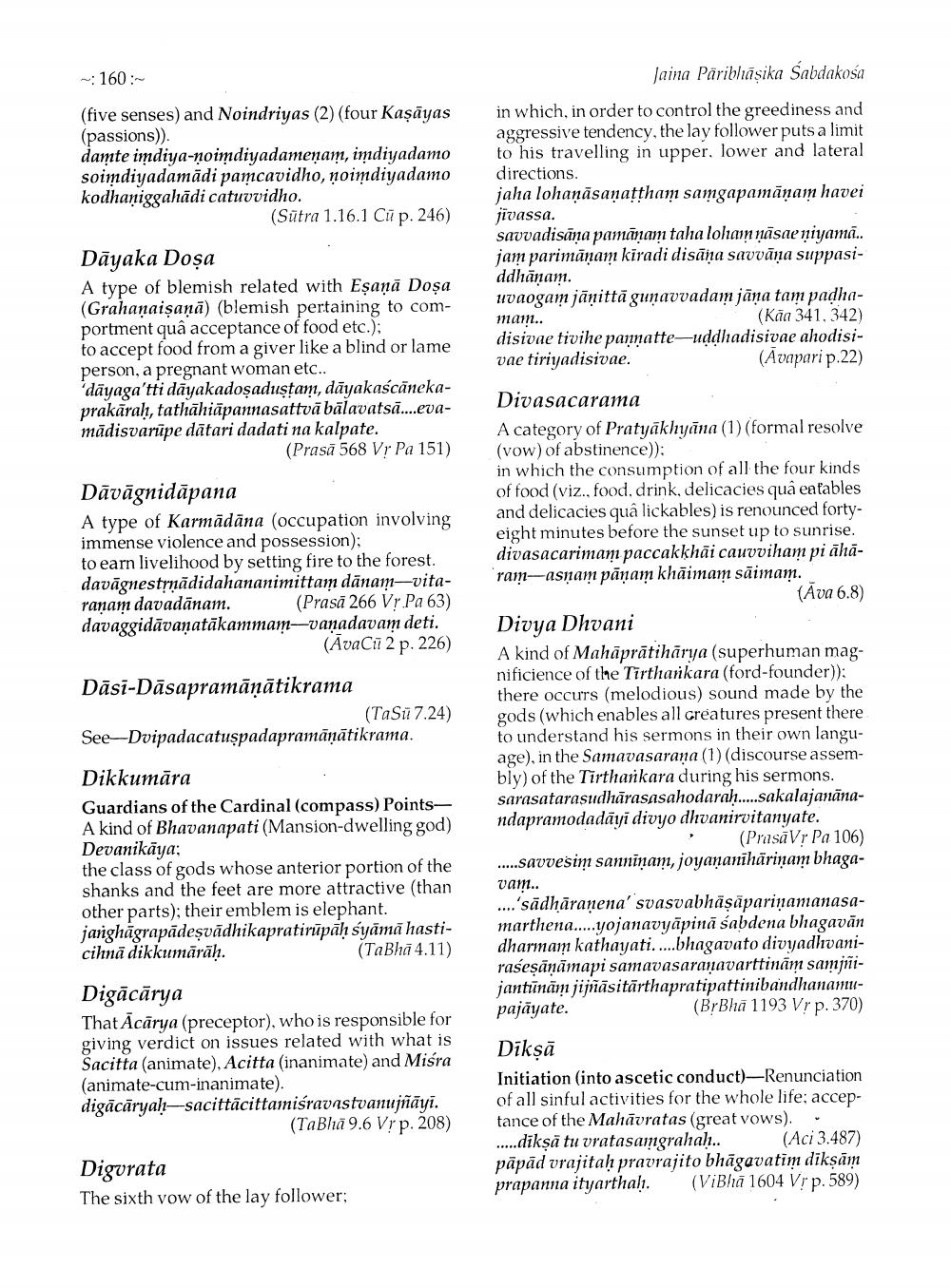________________
~:160~
(five senses) and Noindriyas (2) (four Kaṣāyas (passions)).
damte imdiya-noindiyadameṇam, indiyadamo soimdiyadamadi pamcavidho, noimdiyadamo kodhaniggahadi catuvvidho. (Sutra 1.16.1 Cü p. 246)
Dayaka Doşa
A type of blemish related with Esana Dosa (Grahaṇaiṣand) (blemish pertaining to comportment quâ acceptance of food etc.); to accept food from a giver like a blind or lame person, a pregnant woman etc..
dayaga'tti dayakadoṣaduṣṭamı, dayakaścānekaprakarah, tathāhiäpannasattva bälavatsā....evamadisvaripe datari dadati na kalpate.
(Prasa 568 Vr Pa 151)
Dāvāgnidapana
A type of Karmädäna (occupation involving immense violence and possession): to earn livelihood by setting fire to the forest. davagnestruädidahananimittam danam-vitaranam davadanam. (Prasa 266 Vr Pa 63) davaggidāvaṇatākammam-vaṇadavam deti. (AvaCl 2 p. 226)
Dasi-Dasapramāṇātikrama
See-Dvipadacatuspadapramāṇātikrama.
(TaSi 7.24)
Dikkumara
Guardians of the Cardinal (compass) PointsA kind of Bhavanapati (Mansion-dwelling god) Devanikaya:
the class of gods whose anterior portion of the shanks and the feet are more attractive (than other parts); their emblem is elephant. janghagrapadeṣvadhikapratirupaḥ syämä hasticihna dikkumārāḥ. (TaBha 4.11)
Digācārya
That Acarya (preceptor), who is responsible for giving verdict on issues related with what is Sacitta (animate), Acitta (inanimate) and Miśra (animate-cum-inanimate).
digācāryal-sacittäcittamiśravastvamujñāyi.
(Tabha 9.6 Vṛp. 208)
Digvrata
The sixth vow of the lay follower;
Jaina Paribhasika Sabdakosa
in which, in order to control the greediness and aggressive tendency, the lay follower puts a limit to his travelling in upper. lower and lateral directions.
jaha lohanäsanattham samgapamaṇam havei jivassa.
savvadisana pamanam taha lohamṇāsae niyamā... jam parimaņam kiradi disana savvāņa suppasiddhānam.
uvaogam jänittä guṇavvadam jāņa tam padha(Kaa 341, 342) uddhadisivac ahodisi(Āvapari p.22)
mam..
disivae tivihe pannatte vae tiriyadisivae.
Divasacarama
A category of Pratyakhyana (1) (formal resolve (vow) of abstinence));
in which the consumption of all the four kinds of food (viz., food, drink, delicacies quâ eatables and delicacies quâ lickables) is renounced fortyeight minutes before the sunset up to sunrise. divasacarimam paccakkhai cauvviham pi ähäram-asņam panam khaimam saimam.
(AD 6.8)
Divya Dhvani
A kind of Mahāprätihärya (superhuman magnificience of the Tirthankara (ford-founder)); there occurs (melodious) sound made by the gods (which enables all creatures present there. to understand his sermons in their own language), in the Samavasarana (1) (discourse assembly) of the Tirthankara during his sermons. sarasatarasudhirasasahodarah....sakalajananandapramodadayi divyo dhvanirvitanyate. (PrasaVr Pa 106) .....savvesim sanniņam, joyaṇanihäriṇam bhaga
vam..
.... 'sadharanena' svasvabhāṣāpariṇamanasamarthena......yojanavyāpinā sabdena bhagavan dharmam kathayati.....bhagavato divyadhvaniraseṣaṇāmapi samavasaranavarttinäm samjnijantänä jijñāsitärthapratipattinibandhanapajayate. (BrBha 1193 Vr p. 370)
Dikṣā
Initiation (into ascetic conduct)-Renunciation of all sinful activities for the whole life; acceptance of the Mahāvratas (great vows). . .....dikṣā tu vratasangrahah... (Aci 3.487) päpad vrajitaḥ pravrajito bhagavatim dikṣām prapanna ityarthaḥ. (ViBha 1604 Vrp. 589)




